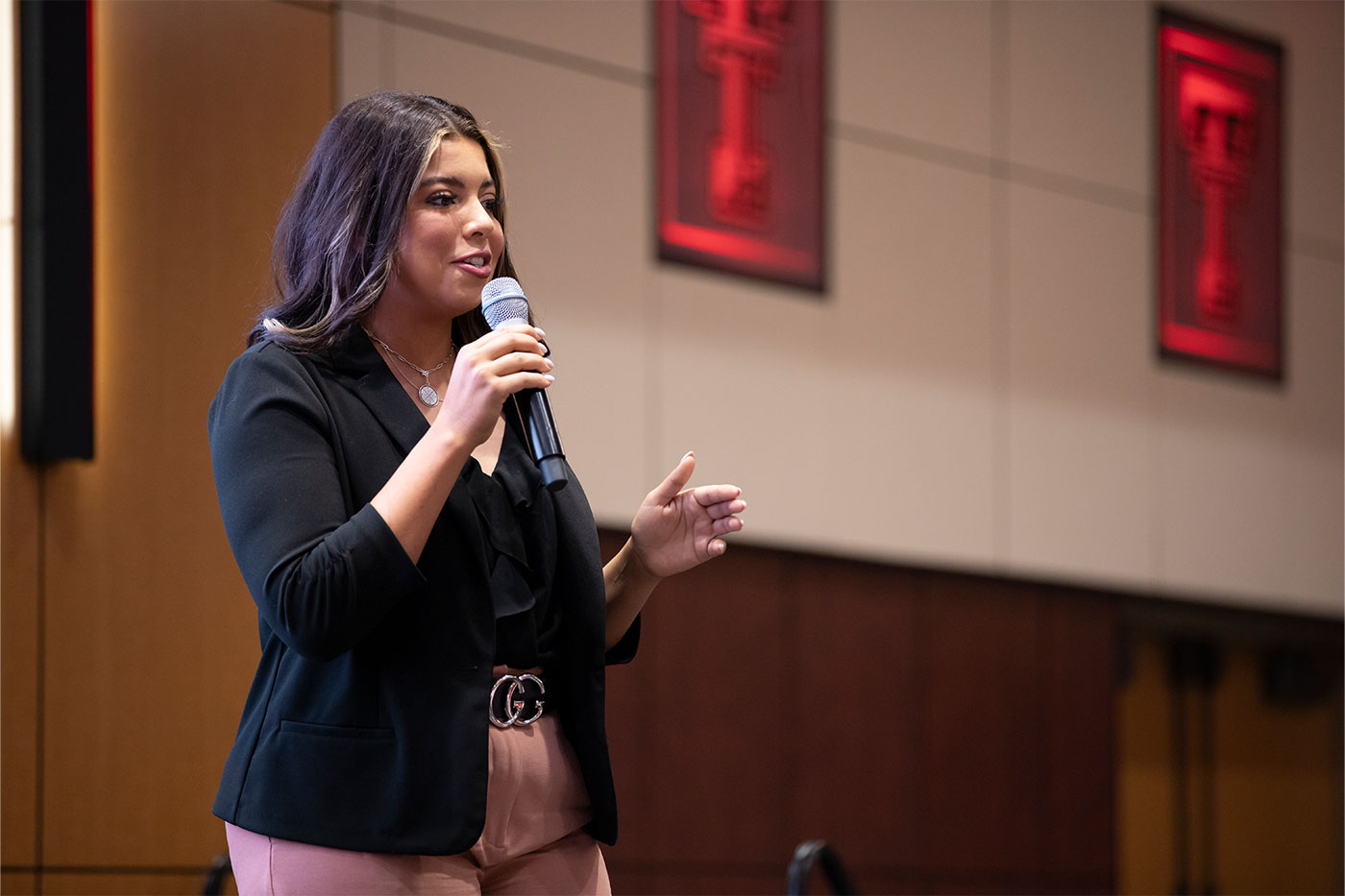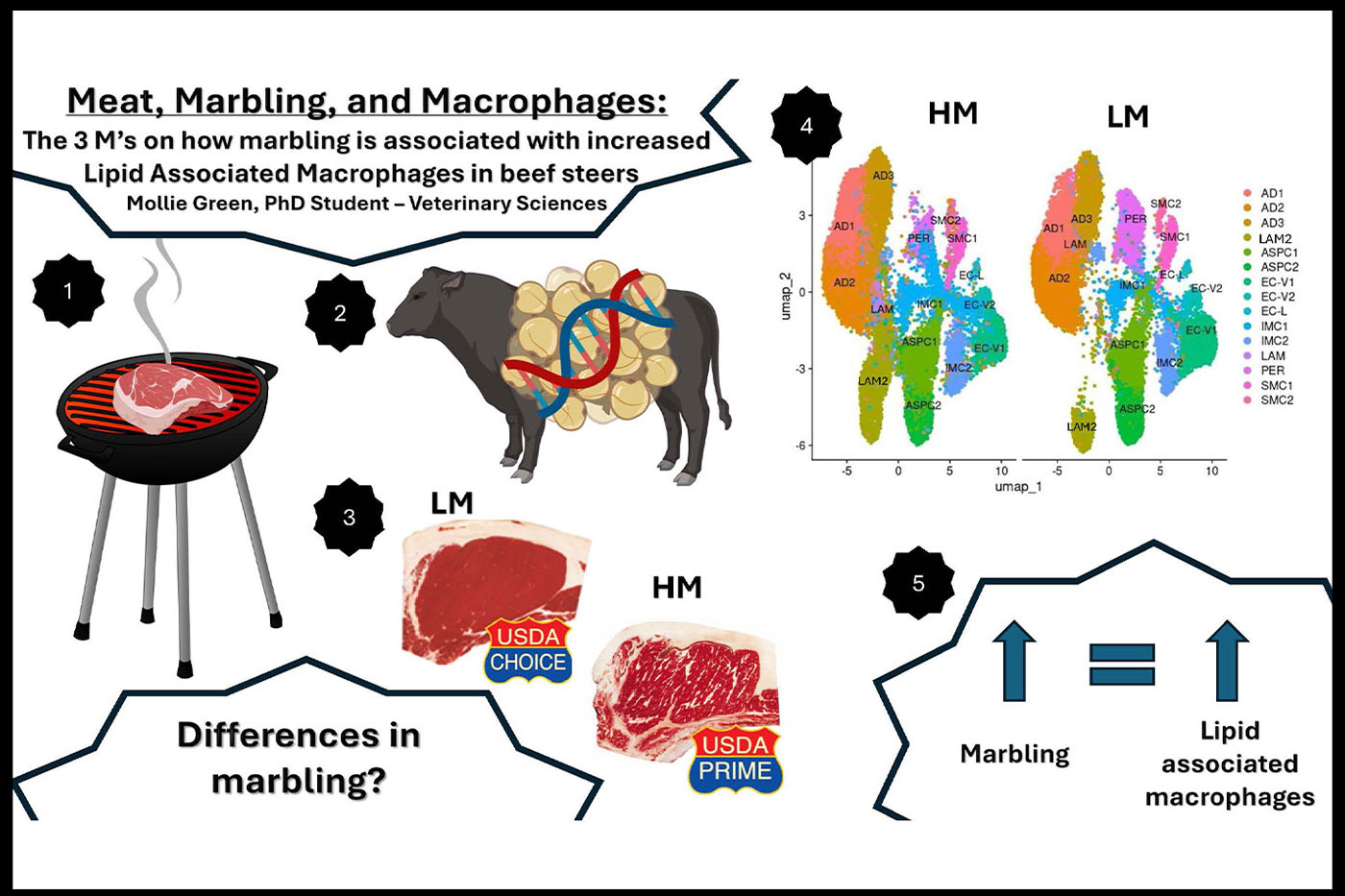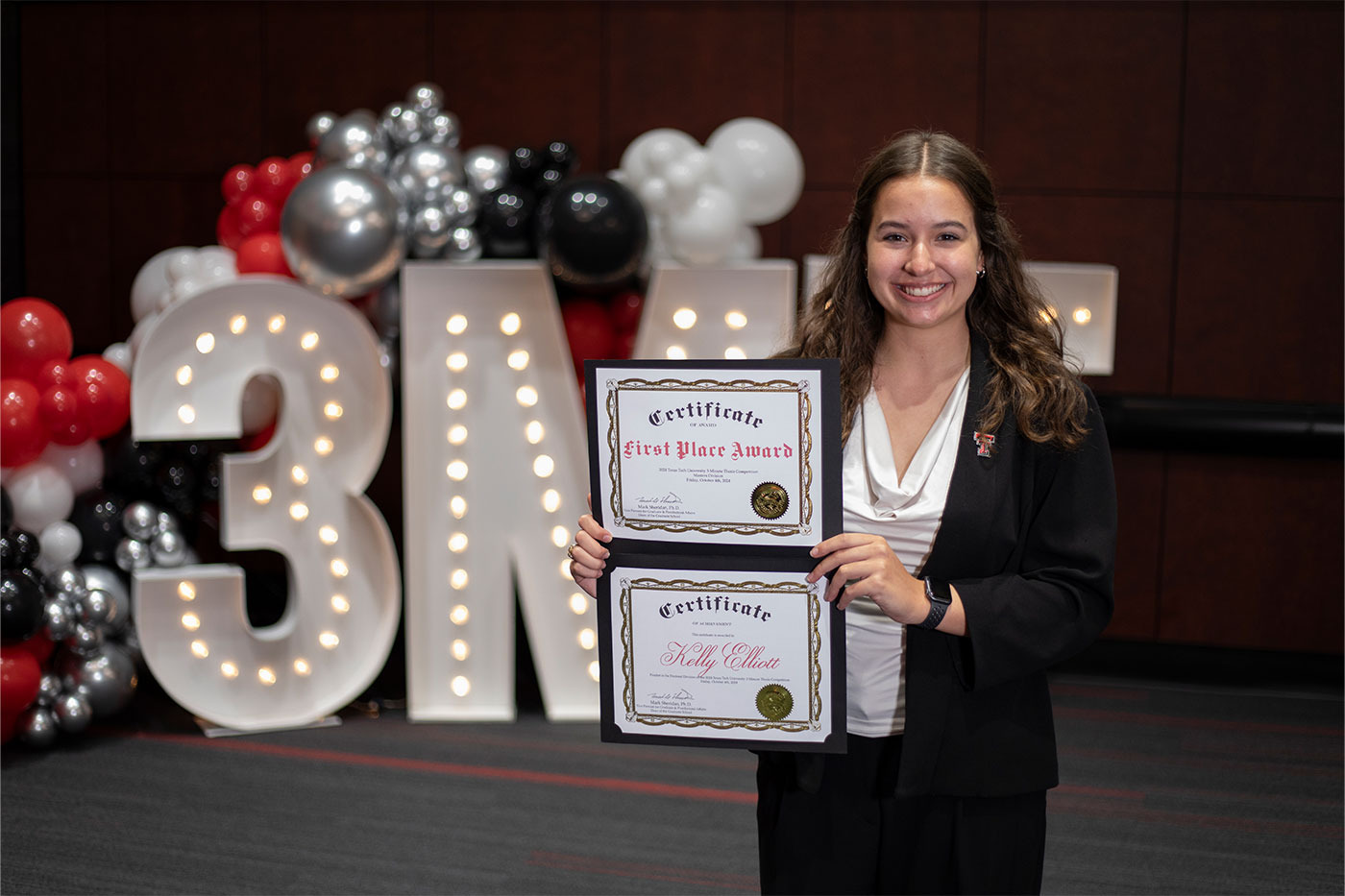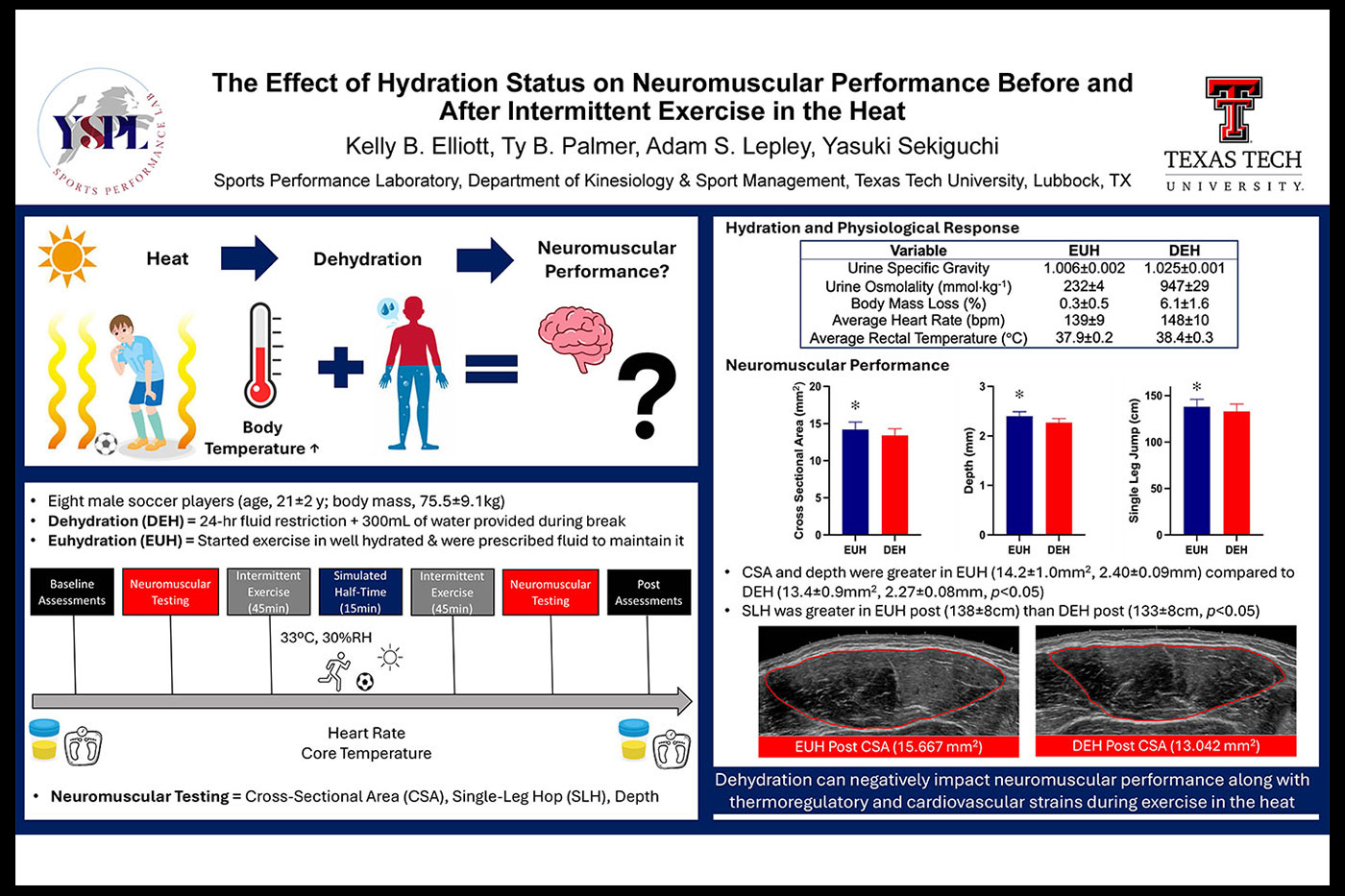The annual event held by the Graduate School helps students convey their complex research topics to a general audience.
Texas Tech University’s Graduate School hosted its annual Three Minute Thesis competition during the first week of October.
This year’s first-place winners were Mollie Green, a second-year animal and food sciences doctoral student, and Kelly Elliott, a second-year kinesiology and sport management master’s student.
“The Three Minute Thesis competition provides students with an opportunity to develop a variety of skills to help them reach their academic and career goals,” said Kristi Gaines, associate dean of the Graduate School. “The competition provides a venue for students to practice communication skills and gain confidence in presenting their research to an audience outside of their discipline.”
Each student created a single static PowerPoint slide and had to effectively explain their research in under three minutes.
The competition is a chance for students to highlight the greater impact of their burgeoning research. By presenting to people outside their discipline, students must connect why their research matters to everyday people.
“Students have the chance to showcase the amazing research and innovative work being done at Texas Tech,” said Mark Sheridan, dean of the Graduate School. “This is work that has significant and lasting impacts on society.”
Throughout the competition, Green and Elliott grew as researchers and communicators and came away with far more than just their first-place wins.
Mollie Green – The Genetic Expression of Marbling
From a young age, Green knew she wanted a career working with large animals like cattle. Every summer, her mom would send Green and her brother from their home in suburban Cleveland to their grandparents’ ranch in southeastern Arizona.
“My mom sent us there for ‘character development,’ as she called it,” Green said. “I really fell in love with the cattle industry there.”
Green originally thought she would become a veterinarian. However, she found a passion for research during her undergraduate studies at Texas A&M. As a doctoral student at Davis College, Green is researching the cellular mechanisms and genetic expression on marbling in beef steers.

For the competition, Green presented the findings from a study she recently conducted on 20 genetically similar steers who were all fed the same diet and housed in the same pen. Once the cattle were taken to a slaughterhouse, Green collected a sample and conducted a single-cell RNA sequencing.
“The way I usually explain it is like comparing a fruit salad to a smoothie,” Green said. “When you do RNA sequencing, you see each gene separately, like a fruit salad. When you look at all the genes composited into a cell, it’s more like a fruit smoothie.”
During the genetic evaluation, Green saw a positive correlation between the amount of marbling and the amount of lipid-associated macrophages (LAM) present in the samples. Essentially, fatter cattle with a higher LAM count produced higher marbling.
Because Green’s research is completely novel – no similar research has been done on cattle before – she compared her study to those done on humans. She noticed the same LAMs appeared in human studies on obesity and type-2 diabetes.
And while humans want to avoid those diseases, Green noted ranchers may want to push their cattle toward obesity to ensure higher marbling.
“It’s a contrast for cattle because that’s the way the market is driven,” Green said. “We want high marbling cattle because that’s what grades prime from choice or select.”
While preparing for the Three Minute Thesis competition, Green tried to envision her grandfather as her target audience.

Green describes her grandfather as an 80-year-old cattle guy. He had worked toward his master’s in animal science decades ago but had to stop after being drafted during the Vietnam War. He has been in the cattle industry for 65 years and tends to be old fashioned in his ranching techniques, so talking about genetics with cattle can be slow going for Green.
“Whenever I’m on the phone talking with him, I try to explain my research and how it’s important to him,” Green said. “I try to keep it simple and think about what he cares about the most. I did the same thing with this competition.”
Green knew she was a capable communicator, but says this competition helped her develop skills in a new direction. She can now reach a broader audience and hopefully deepen the impact of her research.
“You have to make what you say more relatable to people,” Green said. “This was more about the big picture and trying to explain to people who are not in my field why this is important to them.”
Kelly Elliott – The Impact of Hydration Status and Heat on Athletes
Elliott was introduced to kinesiology research during the fall semester of her senior year at Texas Tech. Her professor, Yasuki Sekiguchi, asked any student interested in research to meet with him at the end of the first class. Elliott thought that sounded cool and stayed back.
“I started doing research in hydration and heat studies that fall semester and just fell in love with it,” said Elliott. “I realized I wanted to keep doing this. Everyone in our lab had an opportunity to grow, and I didn’t want this to end once I graduated.”
Elliott was accepted into the accelerated bachelor’s-to-master’s program in kinesiology and started taking graduate level courses during her final undergraduate semester.

For the Three Minute Thesis competition, Elliott presented her study on the effects of hydration status on the neuromuscular performance of athletes, specifically soccer players.
Eight male soccer players were brought into the lab. Measurements were taken during an initial protocol test that included an ultrasound, single-leg hop exercise and a 45-minute intermittent exercise in a controlled environment chamber where heat was set at 33 degrees Celsius (a little more than 91 degrees Fahrenheit) and humidity at 30 percent.
For the experimental trial, which consisted of similar protocol tests and an intermittent exercise that simulated a full 90-minute soccer match, the players were randomly divided into two groups: euhydrated (normally hydrated) and dehydrated. The euhydrated players were able to stay fully hydrated before the test and had their hydration levels maintained throughout the test. The dehydrated players went through a 24-hour fluid restriction and were only given 10 fluid ounces during the experimental trials.
The players then completed the protocol tests again to see how their bodies responded to their hydration levels and to the heat of the environment.
“These tests showed that dehydration can increase cardiovascular strain and thermoregulatory responses in the heat,” Elliott said. “The dehydrated players’ bodies were working much harder than the euhydrated players.”
To convey this complex experiment in a single slide, Elliott relied on pictures and graphic representations to provide talking points during her three-minute presentation.

Elliott had presented posters at conferences before and had strict guidelines; however, the only guideline for this competition was that everything had to be on one static PowerPoint slide.
“It was kind of nice to just freely explain everything,” said Elliott. “I had fun playing with which pictures to include to explain ideas instead of just relying on words. It was still a challenge, but I thought it was nice.”
Elliott also felt the pressure that came with the three-minute time restriction.
“I felt like there was so much I wanted to explain and make sure people understood,” Elliott said. “This competition really helped me compress my research and distill the take-home message.”
Competition Takeaways
Both Green and Elliott loved the opportunity to talk about their research with a general audience and to see what other graduate students are doing around Texas Tech. They shared they can sometimes feel isolated, spending so much time on their own research or with their department colleagues that the size and scope of the university shrinks.
“I feel like I only know the people in my department,” Green said. “It was cool to hear other people’s research and to network and meet other Ph.D. students on campus.”
For Elliott, the Three Minute Thesis competition showed her possibilities beyond a master’s degree. The prospect of a doctorate wasn’t really on her radar prior to the competition.
“It was amazing seeing how much the doctoral students have done with their research in their fields and how accomplished they are,” Elliott said. “I want to be doing the same thing and have the same opportunities. I do believe this competition opened my eyes in a positive way to continuing toward my Ph.D.”
The competition, Green and Elliott said, transformed their abilities as researchers. Both want their research to impact people beyond their disciplines.
To do that they need to be able to deftly discuss their research in general terms for a broader audience.
“Having my research be both scientific and understood by people who aren’t in my field is so important,” Elliott said. “This research can be applied to many different populations, and if we find more impactful results, I will want more people to know about it and benefit from it.”
If their first-place wins at the competition are any indication, both Green and Elliott will have no problem sharing their future research with audiences far and wide.

